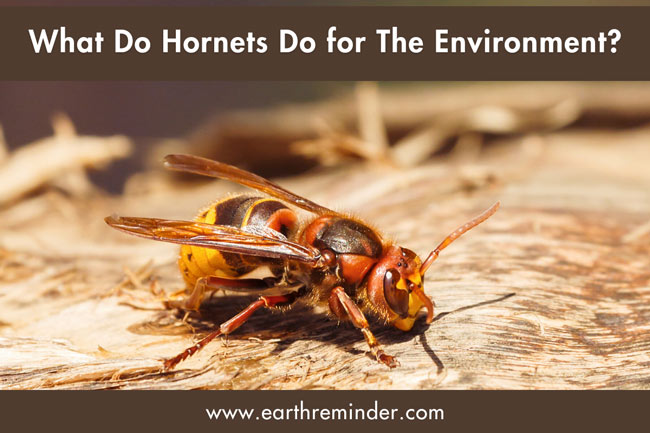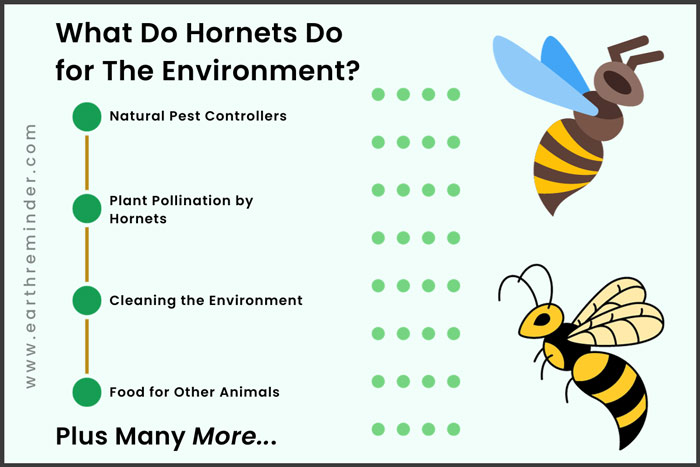What Do Hornets Do for The Environment?
It is true that hornets can sting, but they also do good things for the environment. Hornets are natural predators that help manage the population of other insects and perform a significant function in the environment. They are also a vital food source for birds, small mammals, and reptiles. Hornets’ inclusion within the food chain guarantees that energy is transported across different trophic levels, which is necessary for preserving the ecosystem’s health or diversity. Let’s learn more about how hornets help our environment.
Table of Contents
What Do Hornets Do for the Environment?
The first question that comes to our mind is, “Are hornets good for the environment?” the answer is yes; hornets are good for the environment. Consider these reasons for learning more:
Hornets Are Natural Pest Controllers
Hornets, like most living beings on our planet, serve a purpose. They assist in removing aphids and other pesky garden pests (caterpillars) that destroy crops and gardens by feeding on the young greenery. They sometimes eat mosquitoes and flies, which can save you from getting sick as they carry diseases.
Hornets Hunt Bugs
Hornets are predators with a unique role in managing different insect populations. They manage the populations of such pests by eating them, which is a win-win situation for all parties involved except the eaten bugs. For example, flies, caterpillars, spiders, and many more.
Plant Pollination by Hornets
Hornets perform a crucial task for fruiting and blooming plants, similar to the honey bee. Though pollination isn’t their primary role, hornets do contribute to the environment. They drink nectar from flowers, which is a sweet liquid. They pollinate flowers accidentally as they fly from plant to plant. It’s important to note that pollination won’t happen as often, slowing the growth cycle and impacting the food chain.
“Just like hornets, bees also keep our environment healthy. Read more about why bees are important for the environment.”
Food for Other Animals
Hornets are part of the food chain, which means they serve as food for predators. For example, if a bird sees a hornet flying around, it might catch it and eat it. This helps the bird survive and stay healthy as it gets nutrition from it. They control the hornet population by eating them, which maintains the balance in the environment. This is a natural way to control each other’s population so that no one group grows too big.
“Hornets contribute to an ecosystem’s energy flow. Read how energy flows through an ecosystem here.”
Cleaning the Environment
Hornets clean the environment by eating dead or decaying insects. For example, if there is a garden where some insects have died and are lying on the ground, it might attract bacteria or create trouble if they’re left there. Hornets eat these dead insects and help us and the ecosystem. They keep the environment clean and healthy by eating dead bugs and bringing nutrients back to the soil.
Troubling But Useful Bug
As we discussed above, hornets are crucial for maintaining ecosystem balance and preventing the overpopulation of certain insects that can damage plants. Other than that, hornets also help to break down organic matter. They help in decomposition by recycling nutrients back into the soil when they eat other insects. This helps keep the soil healthy and fertile. This not only supports diverse plant species but also supports various habitats.
Interestingly, hornets are considered a delicacy in several mountain villages throughout Japan. Hornets are frequently consumed raw or deep-fried and offer a significant amount of protein.
It’s clear that hornets benefit the ecosystem, but when they nest inside or near locations where individuals work, live, and play, they are still seen as dangerous pests. Hornets can become more aggressive if surprised or provoked, stinging painfully and possibly inducing an allergic reaction. Therefore, hornet population management is only required if hornets directly threaten people or domestic animals. Hornets perform a worthwhile job and should not be disturbed unless they pose a serious threat.
Conclusion
Hornets are a species of wasp that are crucial to the ecology since they primarily serve as insect predators. They consume other insects as food, especially swarms of flies, caterpillars, and other pests that can harm crops and plants. Hornets visit flowers to gather pollen and nectar, making them significant pollinators. They can still assist in pollination even though they are less efficient than bees. Hornets play an ecological role in contrast to being a component of the food chain. Birds, small animals, and other insects eat on them, while their larvae serve as food for those other predators. In the end, hornets aren’t just insects that sting. They do a lot for the environment. We should remember their positive role in nature next time we see them.

